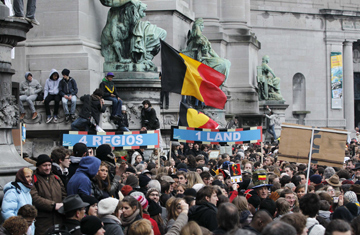
Demonstrators take part in the "Shame" rally calling for the establishment of a government, in Brussels January 23, 2011
Like the fed up children of incessantly squabbling parents, Belgians attempted an intervention on Sunday. In an act of uncharacteristic impatience, an estimated 45,000 Belgians marched through Brussels to press their fumbling political leaders to hurry up and form a government.
A staggering seven months after Belgium held parliamentary elections, bickering politicians are still unable to cobble together a working coalition. The stalemate reflects a widening split between the Dutch-speaking Flemish in the north of the country and the French speakers in Wallonia in the south. But for the protesters, who dubbed their initiative the "Shame" march, their leaders' seeming incompetence is a humiliating indictment of the country's political system.
Organized by five students who met on the Internet just two weeks ago, the march featured banners with slogans like, BEER, FRIES AND A GOVERNMENT, PLEASE and, CLAP YOUR HANDS IF YOU DON'T HAVE A GOVERNMENT. "Many called [the march] meaningless, naive or shallow. But let me ask you, what is meaningless in demanding that we want a government?" co-organizer Thomas Royberghs told the crowd, which was noticeably free of politicians.
The march, held on Belgium's 224th day without a permanent government, is just one of a series of popular and eccentric measures aimed at putting pressure on political leaders to end their deadlock. One of the country's most popular actors, Benoît Poelvoorde, heads a campaign that advocates not shaving until a new government is formed. The website www.lerecorddumonde.be is counting down the days until March 31, when Belgium would break the unenviable world record for a democracy without a government, currently held by Iraq.
And the signs suggest that the record will be broken. Belgium has always been a curio as a country, split between its French and Dutch-speaking communities who rarely intermingle, and refuse to learn each others' language. Dutch speakers, who represent 60% of Belgium's 11 million citizens, tend to vote for more autonomy, while French speakers, fearful of losing their subsidies, have long insisted on maintaining ties to the central government.
The elections last June took this trend to a new level when the biggest bloc of votes went to Bart De Wever, who heads a Flemish nationalist party that calls for outright independence for Flanders. Despite his belligerent rhetoric, De Wever is involved in the seven-party talks to create a coalition that ushers in major institutional reform, but there is a suspicion — and not just on the French-speaking side — that he is systematically sabotaging the talks for his own political ends.
Earlier this month, De Wever baulked at reform proposals drafted by a Flemish socialist mediator, even though they were backed by the six other parties in the coalition talks. The reforms would devolve various health, child-benefit and court functions to the regions; abolish the senate and replace it with a regional assembly; and ensure 26% of the revenue raised from income tax would go to the regions.
"There are intrinsic difficulties in getting democracy to work when you have two language communities on the same footing," says Philippe Van Parijs, a philosophy professor at Catholic University of Louvain and visiting lecturer at Harvard University, who took part in the Brussels march. "In Belgium, we have a split in the political system — with parties organized on language lines — and they now outdo each other in their radical rhetoric. I have pity on the politicians trying to sort it out."
So, can the recent groundswell bring the politicians together? "The march certainly shows there is a certain popular belief in the country," says Johan Albrecht, senior fellow at the Itinera Institute, a Brussels-based non-partisan policy institute. "But we already knew that a significant part of the population was unhappy with the situation. And I don't think policymakers care about these things."
The markets, however, do care. In recent months, Belgium has attracted the attention of investors concerned about the caretaker government's ability to bring down its bloated debt. The country's public debt figure was 97.2% of economic output at the end of 2010, surpassed only by Greece and Italy amongst euro zone nations. Bond markets have become particularly jittery in the shadow of the political stalemate, with credit rating agency Standard and Poor's warning in December that Belgium's credit worthiness might be downgraded if the political crisis is not solved by mid-May.
This is despite Belgium's otherwise competitive economy, which includes a current account surplus, low household debt, a high domestic savings rate and an impeccable repayment record. But the impasse in the coalition talks means markets increasingly see the country at risk of default. So earlier this month, King Albert II broke with his traditional duties as a constitutional monarch by directing the caretaker government to draft a new 2011 budget that would tighten spending and in some way appease the markets.
The uncertainty of investors has not been lost on average Belgians. Until now, the crisis has barely affected them, thanks to a system of strong regional and local administrations that ensures everyday life continues to tick over. And the phlegmatic Belgian character helps them take events in their stride. But the Brussels march shows there are limits to their patience. "It's not good for the image of our country," says Dave Sinardet, a lecturer at the University of Antwerp. "Even if we don't get in the world news often, it's not something to be proud of."
